A Philosophy “written for everyone”: From Alain to Simone Weil
Thierry Leterre“The encounter between Socrates and Plato, happened as a precious one, or to say better, as a clash of opposites . . . . One cannot emphasize enough the contrast between this master and this disciple.”
Those lines, from Alain’s Plato (Alain 2002), could describe the connection that existed between Alain and Simone Weil. In their case, the “encounter” took place in 1925 when Simone Weil attended a philosophy class taught by Alain—or rather Emile Chartier (1868-1951), Alain being his penname. At the time, Weil was preparing for the competitive examinations of the Ecole Normale Supérieure, the elite college of the French academic world. She was admitted in 1928—the fourth female to ever have entered what was at the time a “masculine fortress” (de Lussy 2016). This success did not end the acquaintance between Weil and Alain. Weil remained close to Alain and his ideas for many years, occasionally coming back to attend a class or showing Alain her writings (Kahn 1984). In 1929, she joined the brilliant troop of young intellectuals who participated in the adventure of Libres Propos, the publication organized to give a larger audience to Alain’s ideas.

Similarities and Differences
A detailed account of the lasting similarities between Alain and Weil, as well as of their fundamental differences, has yet to be written. One thing, however, is sure: everything seems oppositional. On the one hand, there was the philosophy teacher who grew up in a strict Catholic rural environment; on the other hand, there was his student, the offspring of the well-to-do Jewish Parisian bourgeoisie. Their physical appearances also reflected the contrast between the tall, large, carefully elegant man, and the frail young woman notoriously indifferent to her looks. Differences in character were equally striking. Alain, when Weil first appeared in his class in 1925, was no longer the jubilant man enjoying life, and women. He was an aging veteran, slowly walking on a cane because of a war wound. Still, he remained attached to the robust philosophy of happiness for which, to this day, he is most well-known.

The orientations of their philosophies eventually revealed the divide. Mysticism was as foreign to Alain’s mind as it was important to Weil’s. It is significant that already in 1932 Alain mentioned the question of mysticism in a letter to Weil and Pétrement; he wrote that “he has passed the age of being a mystic” (Alain 1984). This reticence lasted.
While Alain usually praised Weil’s work, he dismissed the importance of Thibon’s Gravity and Grace — “a vulgar title probably not from her,” is how he put it in his diary of February 1950 (Alain 2018). This was the only negative comment we find from Alain. Every other text about Weil illustrates the “precious connection between [them]” as he phrased it in a 1935 letter. (Alain 1984)
Alain on reading The Need for Roots

We see the impact of the Alain-Weil connection in Alain’s diary entry of October 19, 1949. Upon reading The Need for Roots, he expressed his lifelong admiration for Weil:
“I know this girl; I raised her; I lamented her death; but I [am grateful] that she left this great book. . . . It was written for everyone; it is simply good French in the manner of Montesquieu; . . . it is the good French of a woman who did not hesitate to try factory work and who was able to judge all this . . . . machinery. This tempestuous girl . . . remained enigmatic for me. She was so above her peers that any comparison was impossible. I had nicknamed her ‘the Martian,’ wanting to express [therein] that she had nothing of us and that she judges us all sovereignly.”
Three revealing points
Three things are to be emphasized in this excerpt where every word would require an in-depth comment. First, there were the quasi-fatherly feelings evoked by the “I raised her” (though less connoted in French, it is a strong expression); the nickname “the Martian”; and the somewhat strange comment on her writing. The sentiments expressed by Alain concerning Weil are unique. The word “girl” has no derogatory connotation here. Alain routinely called his male students “the boys,” and his female students “the girls.” In the case of Weil, there is a supplementary nuance of affection in the word—the same word for “daughter” in French—which we find also in the 1932 letter to Weil and her friend Simone Pétrement, where Alain calls them “my two girls”.
A second element worth underscoring is the well-known nickname Alain coined concerning Weil: “The Martian.” It often leads to misconstrued conceptions that Alain meant that she was radically different from the others (which she was certainly in her own way) and potentially bewilderingly so. This is true for many of their contemporaries, and Weil has been called, after a misogynistic fashion, the “Red Virgin.” It is not true of Alain. It is impossible for instance to accept de Lussy’s interpretation who saw in the nickname a “mockery” of her physical appearance, even if kind (de Lussy 2016). What we see, in reality, is that Alain does not accentuate her “difference” but her intellectual superiority over her peers, and in a way over “us all”, whom “she judged . . . . sovereignly”.
The third element, which revolves around the issue of writing, is the most important as it situates Alain in the history of contemporary French philosophy and, by the same token, Weil in this very history.
On writing: Alain & Weil

The remark about Weil’s writing demands reflection: “it is simply good French in the manner of Montesquieu” — indeed, it is a puzzling line. It mixes an apparently dismissive appreciation with a reference to one of the greatest political thinkers and a major French writer. The collision between the two dimensions is typical of Alain’s expression in his old age (he was 81 at the time), which is frequently elliptic and devoid of nuance, especially in his diary. Once Alain’s way of writing at the time is understood (it has proven confusing for many commentators), we can affirm, without a doubt, that the sentence is meant as an extraordinary compliment. However, what is remarkable here is not the commendation in itself, but the reason why Alain insisted on the style of the book. It points to a constant reflection by Alain about the function of language in philosophy, which is an essential legacy from Alain to Weil, and explains, in particular, the thorough attention Weil paid to literary expression of ideas in The Need for Roots.
To understand the particular role style played in the writing of philosophy according to Alain, and how this role was an essential part in the transmission of philosophical attitudes from Alain to Weil, we have to make a detour by way of the sociology of philosophy. Alain belongs to what I have labeled the “young generation of 1900” in philosophy (Leterre 2000). For different reasons, especially institutional ones, this group regarded philosophy as a professional interest and not solely as a free occupation of the mind (Fabiani 1988). The specific contribution of the “young generation of 1900” to the professionalization of the discipline consists in developing specialized outlets, where writing was viewed as the privileged mode of communication of ideas. This orientation was in sharp contrast to the attitude of the previous generation of philosophers such as Jules Lachelier, Alphonse Darlu (teacher of Proust), and Jules Lagneau (teacher of Alain), all of whom were equally involved in the institutionalization of philosophy as an academic discipline but not so much in their actual writings.

Alain, a rising star in the philosophical milieu of his youth, initially contributed to these evolutions. However, around the turn of the 20th century, he broke free from a promising academic career and engaged in political activities that took him to practice editorial journalism to support his radical (i.e., democratic left-wing) politics. This rupture had multiple consequences for Alain. A notable one is that instead of seeking a university chair, he burnt what was probably the draft of his Ph.D. dissertation, and instead found a position in the parallel system of “preparatory classes” (classes préparatoires). There, he taught at the college level, but in a high school; this is how Weil became his student.
An unpredented step and its influence on French philosophy
With journalism, Alain took a quasi-unprecedented step for an academic of the time. This step provoked three major changes that are still influencing French philosophy today. The first one is to consider that while philosophical activity is, by nature, apolitical, it nonetheless has a democratic role to play. This was the very spirit of his short editorial pieces, taking the form of a daily “chat” (“Propos” in French) in his journalism. In these columns, Alain reflected on simple facts of life, social organization, political changes and on any topic of interest from a philosophical standpoint. For over a decade, this journalism was the only form that Alain’s published philosophy took until he joined the army in 1914. At that point, as a soldier and because of censorship, he could no longer write for newspapers.

A second change is that the journalistic exercise made Alain aware that he could not, as he put it in his 1936 autobiography, “write like a professor.” He realized that there was a requirement of style in this type of philosophy for a large audience that the “flat” style of academia (the style of Henri Bergson or of “the Sorbonne,” as Alain referred to his colleagues) could not accommodate. This stylistic mandate had itself a political dimension: the goal was to be read by a non-specialized public, with the intention of acquainting the citizenry with philosophical, and rigorous argumentation. Beyond the necessity of reaching out, the goal was to enhance public debates, and hence, the quality of democratic life itself. In other words, philosophy was for everybody, carried through everybody’s language, because the public sphere in a democracy required well-articulated positions. This was exactly what he eventually found in Weil: a philosophy “written for everyone”.
The third change was the result of the two previous ones: the democratic attention to style was a way to clearly express one’s thought for the benefit of all, a way to bring back the antique conception according to which beauty is a sign of truth and a sign of the good. Writing well did not mean that one was right, but writing poorly revealed poverty of thought.

These are real innovations concerning the role and the meaning of philosophy. In the 1920s, they became common among the young, post-war, generation of philosophers to which Weil belonged. Raymond Aron, Georges Canguilhem, Jean-Paul Sartre, Simone Beauvoir, all were in direct contact with Alain, some as his students and followers, others simply as occasional visitors to his public appearances, all as his readers. That was how Alain’s influence on “the engaged philosopher,” as Sartre put it, made him the first of those “French intellectuals” who came from philosophical studies but practiced either political engagement (Aron, Canguilhem, Weil) or political influence (Sartre, Albert Camus), with some degree of fluidity between philosophy and literature.
Weil’s philosophical choice, unlike Sartre or Beauvoir or Camus, was not literature; it was not, like Aron, political science, or like Canguilhem a central place in the institution of philosophy. Though she acknowledged a “rupture in continuity in the course of time, which . . . rejected [her] youth in a far-away historical past,” (Weil 1984), she remained loyal to the very inspiration she received from Alain. In a superb diary entry of 1950, he noted that Weil’s work was one of a “life dedicated to direct knowledge, and to the fight for the weak and the poor.” That was, ultimately, what Alain meant by writing philosophy, simply, and for everyone.
Sources
Note: all citations and book titles have been translated from French by the author.
Alain. 1984. “Lettre du 30 Xbre 1932 [à Simone Weil et Simone Pétrement].” Bulletin de l’Association des Amis d’Alain, no. 58: 14.
———. 2002. Les Passions et la Sagesse. Edited by Bénézé, Georges. Bibliothèque de La Pléiade. Paris: Gallimard.
———. 2018. Journal inédit 1937-1950. Edited by Emmanuel Blondel. Paris: Des Equateurs.
Fabiani, Jean-Louis. 1988. Les philosophes de la République. Le sens commun 82. Paris: Éd. de Minuit.
Kahn, Gilbert. 1984. “Simone Weil et Alain.” Bulletin de l’Association des Amis d’Alain, no. 58: 1–13.
Leterre, Thierry. 2000. La raison politique: Alain et la démocratie. Philosophie d’aujourd’hui. Paris: Presses universitaires de France.
Lussy, Florence de. 2016. “Chapitre II. La pensée pour vocation.” In , 9–16. Que sais-je ? Paris cedex 14: Presses Universitaires de France. https://www.cairn.info/simone-weil–9782130731450-p-9.htm
Weil, Simone. 1984. “Lettre à Alain [reçue mai 1941].” Bulletin de l’Association des Amis d’Alain, no. 58: 30–39.
About the author

Dr. Thierry Leterre is a Professor of Political Science at the University of Versailles-St-Quentin-en-Yvelines and Miami University.
Educated in France, Leterre is a former fellow of the Ecole Normale Supérieure (Paris) and holds a Doctorate in Philosophy from the University of Paris Panthéon Sorbonne. He was distinguished with the National French Agrégation award in Philosophy and the National Agrégation award for full professorship in Political Science.
A specialist of French philosopher Alain, about whom he wrote two books, Leterre authored three other books and more than 60 academic articles and book chapters, mostly in the field of the conceptual history of politics. He has been working on topics related to freedom and liberalism, peace and war, as well as social representations of politics. He also contributed to a research project in the field of security studies for which he was awarded a Fulbright-Schuman research grant at Georgetown University (DC, USA). Passionate about the dissemination of scientific results in politics and society, he has been a columnist for French newspapers Libération and La Croix where he still contributes on a regular basis.
Dr. Leterre is the President of the philosophical and literary organization Association des Amis d’Alain. His social activism includes the arts dissemination organization Moving Lab (Board) and the European Platform for Compassionate Leadership for Climate & Peace (Secretary).
2 Recommendations
